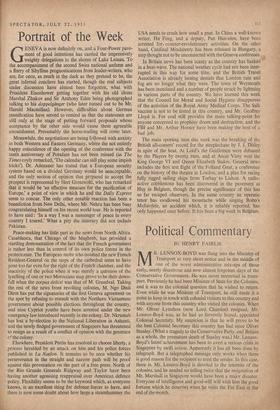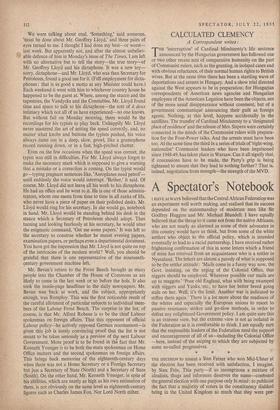Political Commentary
By 'HENRY FAIRLIE • MR. LENNOX-BOYD was flung into the Ministry of Transport at very short notice and in. the middle of one of the worst administrative mix-ups of those early, nearly disastrous and now almost forgotten days of the Conservative Government. He was never interested in trans- port. Previously he had been Minister of State for the Colonies, and it was to the colonial question that he wished to return. Even while he was Minister of Transport, he still made it a point to keep in touch with colonial visitors to this country and with anyone from this country who visited the colonies. When Mr. Oliver Lyttelton (now Lord. Chandos) resigned, Mr. Lennox-Boyd was, as he had so fervently hoped, appointed Colonial Secretary. My suspicion, is that he will prove to be the best Colonial Secretary this country has had since Oliver Stanley. (What a tragedy to the Conservative Party, and Britain as a whole, the premature death of Stanley was.) Mr. Lennox- Boyd's latest achievement has been to avert a serious crisis in Singapore by swift action. Apparently it has all been done by telegraph. But a telegraphed message only works when there is good reason for the recipient to trust the sender. In this case. there is. Mr. Lennox-Boyd is devoted to the interests of the colonies, and he needed no telling twice that the resignation of Mr. Marshall in Singapore would have been a major disaster. Everyone of intelligence and good-will will wish him the good fortune which he deserves when he visits the Far East at the end of the month. We were talking about coal. 'Something,' said someone, 'must be done about Mr. Geoffrey Lloyd,' and three pairs of eyes turned to me. I thought I had done my best—or worst— last week. But apparently not, and after the almost unbeliev- able defence of him in Monday's issue of The Times, I am left with no alternative but to tell the story—the true story—of Mr. Geoffrey Lloyd and his dictaphone. It was a new toy— sorry, dictaphone—and Mr. Lloyd, who was then Secretary for Petroleum, found a good use for it. (Full employment for dicta- phones : that is as good a motto as any Minister could have.) Each weekend it went with him to whichever country house he happened to be the guest at. Where, among the stucco and the tapestries, the Vandycks and the Constables, Mr. Lloyd found time and space to talk to his dictaphone—the sort of d deux intimacy which not all of us have experienced—no one knows. But without fail on Monday morning, there would be the recordings for his typists to play back. Unhappily Mr. Lloyd never mastered the art of setting the speed correctly, and, no matter what knobs and buttons the typists pushed, his voice always came out in a deep, slow, growl, like a gramophone record running down, or in a fast, high-pitched chatter.
Even on the few occasions when the speed was correct, the typist was still in difficulties. For Mr. Lloyd always forgot to make the necessary mark which is supposed to give a warning that a mistake or a correction is coming. On the typist would go—typing pregnant sentences like, 'Aeroplanes need petrol'— until suddenly the voice would interrupt. 'Bother,' it said. Of course, Mr. Lloyd did not leavq all his work to his dictaphone. He had an office and he went to it. He is one of those adminis- trators, whom one meets from time to time in all ranks of life, who never have a piece of paper on their polished desks. Mr. Lloyd would ring for his secretary. In she would go, notebook in hand. Mr. Lloyd would be standing behind his desk in the stance which a Secretary of Petroleum should adopt. Then turning and looking fearlessly at his secretary, he would utter the enigmatic command, 'Get me some papers.' It was left to the secretary to construe whether he meant evening papers, examination papers, or perhaps even a departmental document. You have got the impression that Mr. Lloyd ip not quite on top of the intricacies of the modern world? Wells you should be grateful that there is one representative of the nineteenth- 9entury government machine left.
Mr. Bevan's return to the Front Bench brought as many people into the Chamber of the House of Commons as are likely to come in the last week or so before the hols. It also took the inside-page headlines in the daily newspapers. Mr. Bevan was back at work, and the subject, appropriately enough, was Remploy. This was the first noticeable result of the careful allotment of particular subjects to individual mem- bers of the Labour Front Bench. The surprise in the list, of course, is that Mr. Alfred Robens is to be the chief Labour spokesman on foreign affairs. That this opponent of official Labour policy—he actively opposed German rearmament—is given this job is surely convincing proof that the list is not meant to be taken seriously as a preview of the next Libour Government. More proof is to be found in the fact that Mr. Kenneth Younger is to be both the main spokesman on Home Office matters and the second spokesman on foreign affairs. This brings back memories of the eighteenth-century days when there was not a Home Secretary or a Foreign Secretary but just a Secretary of State (North) and a Secretary of State (South). On the other hand, Mr. Kenneth Younger, in spite of his abilities, which are nearly as high as his own estimation of them, is not obviously on the same level as eighteenth-century figures such as Charles James Fox. Nor Lord North either.



















































 Previous page
Previous page